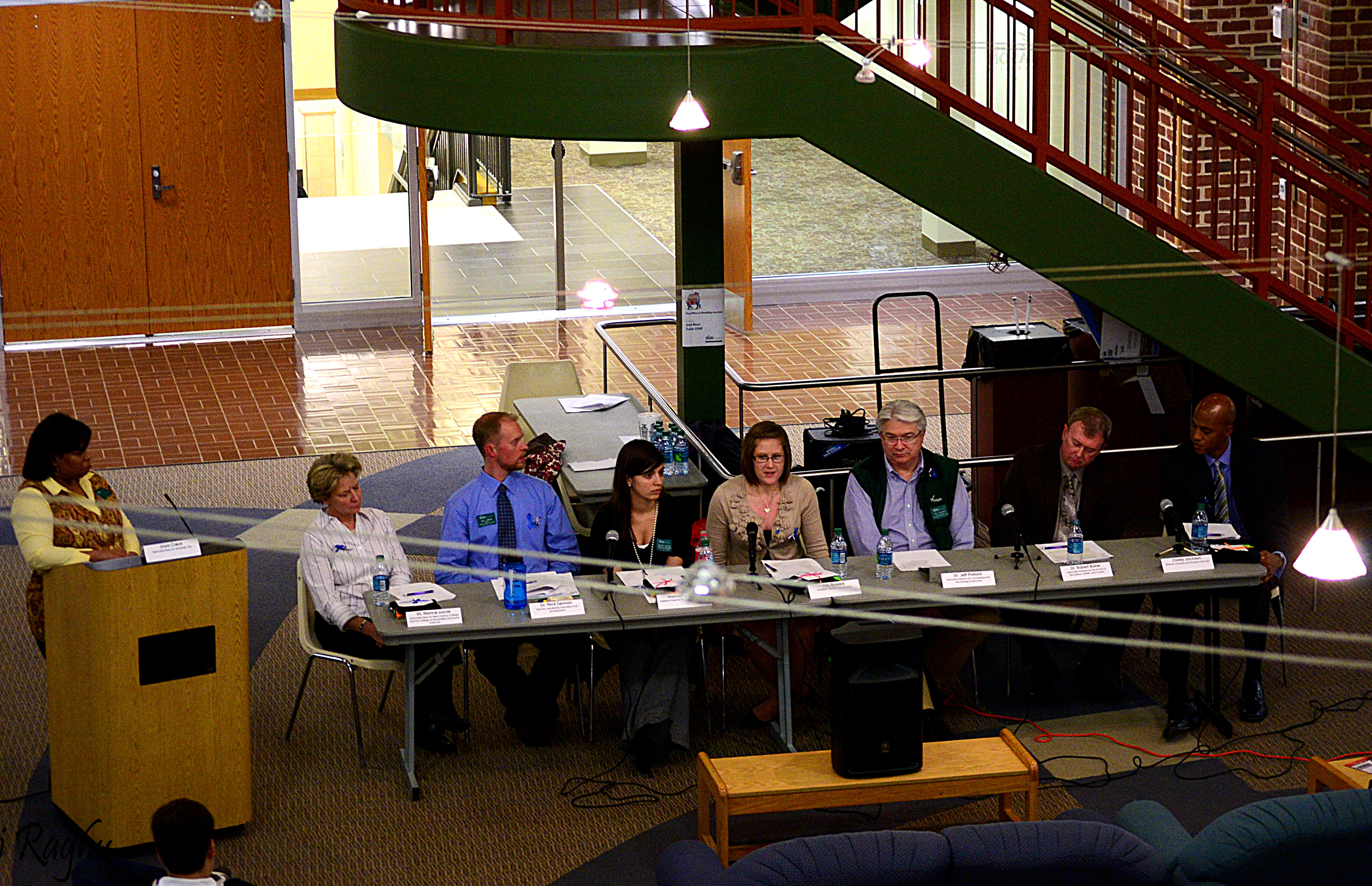Panel addresses moral and ethical questions involved in Penn State scandal
 The discussion panel, hosted by Mason's LEAD Office, addresses moral and ethical questions involved in the Penn State scandal. (Gopi Raghu)
The discussion panel, hosted by Mason's LEAD Office, addresses moral and ethical questions involved in the Penn State scandal. (Gopi Raghu)
Members of the Mason community gathered Tuesday for a panel discussion on the sexual abuse scandal that has received national media coverage and shaken the Penn State University community to its core in recent weeks.
Students and faculty, including some Penn State alumni now connected to Mason, came together for the discussion hosted by the Office of Leadership Education and Development (LEAD). The event was held Tuesday evening in the SUB I Patriot Lounge.
According to reports, the controversy erupted Nov. 5 when Jerry Sandusky, former defensive coordinator for the Penn State Nittany Lions football team, was arrested for allegedly molesting eight boys over a 15-year span. Four days later, on Nov. 9, longtime head coach and university icon, Joe Paterno, was fired because of claims he allegedly knew about the molestation incidents but did not do enough to report them. The incident also led to the dismissal of Penn State President Graham Spanier.
Participants in the Tuesday discussion looked at the series of events at Penn State and discussed how it can be applied to leadership, values, and ethics on university campuses. Moderating the discussion was Associate Dean for University Life Joya Crear.
Panelists for the discussion included Student Body President Allyson Bowers, Associate Dean for New Century College and the College of Humanities and Social Sciences Dr. Nance Lucas, LEAD Director Dr. Nick Lennon, Assistant Director of Student Government Melissa Masone, and Director of Equity and Diversity Services Corey Jackson.
Among the moral issues up for discussion was Paterno’s obligation to report the incident.
Mason Associate Dean for New Century College Nance Lucas, a Penn State alumnus, said that as a football coach, Paterno is a leader that has a lot of influence, and he did not fulfill his duty.
Associate Professor for the School of Recreation, Health, and Tourism, Robert Baker, also a Penn State alumnus, echoed Lucas’s remarks.
“We [all] have responsibilities as human beings” said Baker. “[Our] first responsibility is as a human being, not an employee”.
Baker said there is a culture of cover up within our society and that leadership can have an effect on that. He also said with increased credibility, comes more responsibility.
Crear expanded the line of moral questioning by asking the panel the difference between someone’s moral obligation and legal obligation.
Corey Jackson, director of Equity and Diversity Services, differentiated the two by saying a legal obligation is what you are required to do and ethics is what you ought to do. Jackson went on to use slavery as an example of something that was once legal, but not ethically right.
There was also speculation as to whether assistant coach Mike McQuery should have done more when he allegedly witnessed Sandusky molesting a boy in 2002. According to the Washington Post, McQuery has been put on administrative leave.
Melissa Masone, Student Government advisor, said she tries to put herself into McQuery’s shoes. A graduate assistant at the time, she said it may have been difficult for him to report something like that about his superior.
Executive Director for Counseling and Psychological Services, Dr. Jeff Pollard, cited the by-standard effect: a phenomenon in which the more people witness something horrific, the fewer report it. He said that the natural instinct of people is to run away from something awful and he wants to believe that is what happened at Penn State.
The Penn State incident carries implications to universities everywhere and the panelists discussed how Mason can be made a safer space and how such an incident can be prevented from ever happening here.
“Continue to empower students to be ambassadors and leaders,” said Jackson, who also said a crisis-management process, would be beneficial.
In reaction to Paterno’s firing, Penn State students took to the streets on Nov. 9 to riot in frustration, according to reports. The police reacted with pepper spray as the students overturned a news van. Another question addressed by the panel was whether the same response would have happened at Mason.
“I honestly don’t think we would have the same response,” said Student Government President Ally Bowers. “[The riots] showed a poor representation on [Penn State].”
Pollard said that although human beings are bad at predicting things, he wouldn’t want to be a part of a university that responded so poorly.
“I honestly wouldn’t want to work at a place that had the same kind of reaction that Penn State had,” said Pollard.
Lucas said she believes the timeline of the events and the media pressure applied to the scandal had a large role in how the controversy is playing out.
“I don’t think they would have fired Joe Paterno and I don’t think they would have fired the president if the media didn’t bring it to the public,” said Lucas, who hopes Mason would not have waited nine years to act on such serious allegations.
